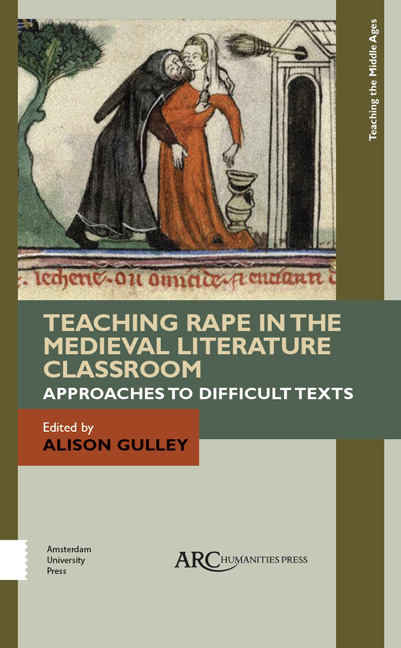Book contents
- Frontmatter
- Contents
- Acknowledgements
- Chapter 1 Introduction: Teaching Rape and Meeting the Challenges of the TwentyFirstCentury Classroom
- Chapter 2 Medieval Saints and Misogynist Times: Transhistorical Perspectives on Sexual Violence in the Undergraduate Classroom
- Chapter 3 Teaching Medieval Rape Culture across Genre: Insights from Victimology
- Chapter 4 Bringing the Bystander into the Humanities Classroom: Reading Ancient, Patristic, and Medieval Texts on the Continuum of Violence
- Chapter 5 From Bystander to Upstander: Reading the Nibelungenlied to Resist Rape Culture
- Chapter 6 Speech, Silence, and Teaching Chaucer’s Rapes
- Chapter 7 Classroom PSA: Values, Law, and Ethics in “The Reeve’s Tale”
- Chapter 8 “How do we know he really raped her?”: Using the BBC Canterbury Tales to Confront Student Skepticism towards the Wife of Bath
- Chapter 9 Teaching the Potiphar’s Wife Motif in Marie de France’s Lanval
- Chapter 10 Sexual Compulsion and Sexual Violence in the Lais of Marie de France
- Chapter 11 Troubadour Lyric, Fin’amors, and Rape Culture
- Chapter 12 The Knight Coerced: Two Cases of Raped Men in Chivalric Romance
- Chapter 13 Teaching Rape to the HeMan Woman Haters Club: Chrétien de Troyes at a Military School
- Chapter 14 Rape, Identity, and Redemption: Teaching “Sir Gowther” in the Community College Classroom
- Notes on Contributors
- Index
Chapter 1 - Introduction: Teaching Rape and Meeting the Challenges of the TwentyFirstCentury Classroom
Published online by Cambridge University Press: 23 January 2021
- Frontmatter
- Contents
- Acknowledgements
- Chapter 1 Introduction: Teaching Rape and Meeting the Challenges of the TwentyFirstCentury Classroom
- Chapter 2 Medieval Saints and Misogynist Times: Transhistorical Perspectives on Sexual Violence in the Undergraduate Classroom
- Chapter 3 Teaching Medieval Rape Culture across Genre: Insights from Victimology
- Chapter 4 Bringing the Bystander into the Humanities Classroom: Reading Ancient, Patristic, and Medieval Texts on the Continuum of Violence
- Chapter 5 From Bystander to Upstander: Reading the Nibelungenlied to Resist Rape Culture
- Chapter 6 Speech, Silence, and Teaching Chaucer’s Rapes
- Chapter 7 Classroom PSA: Values, Law, and Ethics in “The Reeve’s Tale”
- Chapter 8 “How do we know he really raped her?”: Using the BBC Canterbury Tales to Confront Student Skepticism towards the Wife of Bath
- Chapter 9 Teaching the Potiphar’s Wife Motif in Marie de France’s Lanval
- Chapter 10 Sexual Compulsion and Sexual Violence in the Lais of Marie de France
- Chapter 11 Troubadour Lyric, Fin’amors, and Rape Culture
- Chapter 12 The Knight Coerced: Two Cases of Raped Men in Chivalric Romance
- Chapter 13 Teaching Rape to the HeMan Woman Haters Club: Chrétien de Troyes at a Military School
- Chapter 14 Rape, Identity, and Redemption: Teaching “Sir Gowther” in the Community College Classroom
- Notes on Contributors
- Index
Summary
This volume was conceived and written at a time of unprecedented attention in the United States to rape and rape prevention on college campuses and more specifically grows out of a panel that I organized for the May 2014 International Congress on Medieval Studies at Kalamazoo, in which I and two other presenters explored the problem of how to approach medieval texts that feature sexual violence, in ways that are both academically sound and ethically appropriate for our students. The panel itself resulted from an interaction with a student in a sophomorelevel British Literature class. During a discussion of Geoffrey Chaucer's “The Wife of Bath's Tale,” a student, referring to the rape that precipitates the knight's quest for the thing that women most desire, piped up: “How do we know she was really raped?” I was caught off guard, first, because the rape is unambiguously stated (“By verray force, he rafte hire maydenhed” [III. 886– 9]) and, second, because the August 2012 rape of a Steubenville, Ohio teenager by her classmates— and the controversial response to it by both the community and the media— was very much in the news that week as the case went to trial. To me, and to much of the rest of the class, if the ensuing discussion is any indication, the question reflected the many disjointed and often contradictory attitudes toward women, sexuality, and violence. Despite having taught the tale many times and to hundreds of students over the years, I came away from the class feeling that I had not anticipated the kinds of questions and assumptions students bring to such a text and thus had not adequately prepared myself to teach the work in a such a specific modern context. Judging by the lively discussion that followed the presentations at Kalamazoo, I was not alone. Many teachers, it seems, are eager to develop pedagogical strategies for addressing sensitive topics in the classroom. To that end, this collection includes articles that contextualize scenes of rape, attempted rape, and false accusations in a variety of literary works within the politically charged environment that our students, and ourselves as teachers, study and learn.
- Type
- Chapter
- Information
- Teaching Rape in the Medieval Literature ClassroomApproaches to Difficult Texts, pp. 1 - 11Publisher: Amsterdam University PressPrint publication year: 2018



